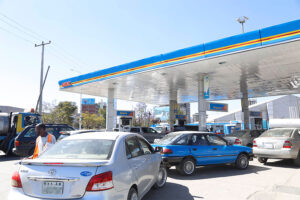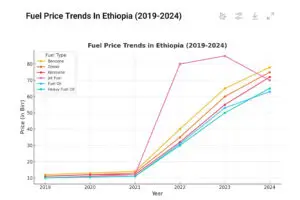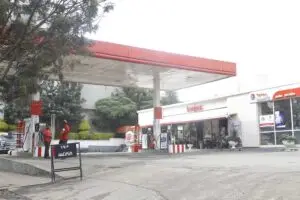Revenue Leakage in the Ethiopian Gas Station Industry
The Ethiopian gas station industry is critical to supporting the country’s growing transportation and industrial sectors. However, a persistent challenge facing the sector is revenue leakage—an issue that quietly drains profitability and undermines operational sustainability. From fraud and poor inventory management to systemic inefficiencies, revenue leakage prevents gas station owners from fully capitalizing on their investments.
In this blog post, we’ll explore the root causes of revenue leakage in Ethiopia’s gas station industry, its impact on stakeholders, and practical solutions to address this pressing problem.
What is Revenue Leakage?
Revenue leakage refers to the loss of income due to inefficiencies, theft, fraud, or mismanagement. In Ethiopia’s gas station industry, revenue leakage occurs at various stages, from fuel procurement to final customer sales, often unnoticed until it causes significant financial harm.
1. Fuel Theft and Diversion
Fuel theft is one of the most common causes of revenue leakage in Ethiopia’s gas station sector. It occurs at multiple levels, from transportation to storage and sales.
Key Issues:
- Driver collusion: Fuel transport drivers often siphon fuel during transit, sometimes in collaboration with gas station staff or external parties.
- Unauthorized sales: Some gas station operators divert fuel to the black market, where it fetches higher prices.
- Inaccurate dispensing: Malfunctioning fuel pumps or deliberate manipulation by attendants result in customers receiving less fuel than paid for.
Impact:
Fuel theft significantly reduces inventory without corresponding revenue, eroding profitability and damaging customer trust.
2. Inadequate Inventory Management
Many gas stations in Ethiopia rely on outdated or manual methods to manage inventory, leaving room for errors and mismanagement.
Key Issues:
- Inaccurate record-keeping: Manual logs of fuel levels and sales are prone to errors or intentional manipulation.
- Poor stock monitoring: A lack of real-time tracking makes it difficult to detect discrepancies between fuel purchased and sold.
- Loss from evaporation: Without proper storage facilities, fuel losses due to evaporation are often unaccounted for in financial records.
Impact:
Inefficient inventory management leads to undetected stock shortages, loss of revenue, and difficulty in identifying the root causes of leakage.
3. Employee Fraud and Misconduct
Gas station employees play a critical role in daily operations, but their actions can also be a source of revenue leakage if proper controls are not in place.
Key Issues:
- Cash misappropriation: Employees sometimes pocket cash from sales, especially in cash-dominated transactions.
- False reporting: Attendants may underreport sales or inflate expenses to conceal theft.
- Unauthorized discounts: Employees may provide unapproved discounts to friends or regular customers, reducing profitability.
Impact:
Employee misconduct not only leads to financial losses but also creates a culture of dishonesty, affecting long-term business operations.
4. Inefficient Payment Systems
The reliance on cash transactions in Ethiopia’s gas station industry creates opportunities for revenue leakage and mismanagement.
Key Issues:
- Lack of digital payment options: Cash-based transactions are harder to track, making it easier for employees to skim off the top.
- Unreliable transaction records: Without electronic systems, tracking daily sales becomes cumbersome and prone to errors.
- Delayed reconciliation: Manual reconciliation of cash and inventory at the end of each day increases the likelihood of discrepancies going unnoticed.
Impact:
Inefficient payment systems reduce transparency, increase the risk of fraud, and make financial auditing more challenging.
5. Pricing Irregularities
Fuel prices in Ethiopia are regulated, but irregularities in pricing practices often lead to revenue leakage.
Key Issues:
- Overcharging customers: Some stations charge above the regulated price, pocketing the difference illegally.
- Underpricing for personal gain: In some cases, operators or employees sell fuel at lower prices to favored customers or resellers, causing a loss in revenue.
- Failure to display prices: A lack of transparency in pricing allows operators to manipulate rates based on customer ignorance.
Impact:
Pricing irregularities damage customer trust, invite regulatory penalties, and distort market competition.
6. Operational Inefficiencies
Revenue leakage is also caused by operational inefficiencies that inflate costs and reduce profitability.
Key Issues:
- High maintenance costs: Frequent breakdowns of fuel pumps and storage facilities increase operational expenses.
- Unoptimized fuel procurement: Poor negotiation with suppliers or reliance on middlemen results in higher procurement costs.
- Idle workforce: Inefficient workforce management leads to unnecessary payroll expenses without corresponding productivity.
Impact:
Operational inefficiencies reduce net revenue, making it harder for gas station operators to reinvest in their businesses or expand operations.
7. Regulatory Gaps and Compliance Costs
Weak regulatory oversight and high compliance costs contribute indirectly to revenue leakage by creating loopholes and financial burdens for station owners.
Key Issues:
- Delayed licensing approvals: Long bureaucratic processes delay station operations, resulting in lost revenue opportunities.
- Fines for non-compliance: Operators who inadvertently violate unclear or poorly enforced regulations face financial penalties.
- Lack of enforcement: Limited regulatory monitoring allows illegal practices to flourish, reducing overall market integrity.
Impact:
Regulatory inefficiencies create an uneven playing field, discouraging legitimate operators while enabling unethical practices.
Solutions to Address Revenue Leakage
Tackling revenue leakage in the Ethiopian gas station industry requires a combination of technology, training, and regulatory reform. Here are some actionable solutions:
1. Invest in Technology
- Install automated inventory management systems to track fuel levels in real time.
- Use digital payment systems to reduce reliance on cash and improve transaction transparency.
- Implement advanced fuel pumps with tamper-proof calibration systems.
2. Strengthen Employee Oversight
- Train employees on ethical practices, fraud prevention, and the importance of compliance.
- Use surveillance systems to monitor daily operations and deter theft.
- Introduce performance-based incentives to reduce misconduct and improve productivity.
3. Improve Supply Chain Management
- Establish direct contracts with fuel suppliers to eliminate middlemen and reduce procurement costs.
- Use GPS tracking for fuel transportation to prevent theft during transit.
- Invest in better storage facilities to minimize losses due to evaporation.
4. Enhance Pricing Transparency
- Display government-regulated prices prominently at every station.
- Conduct regular audits to ensure compliance with pricing and subsidy regulations.
- Use digital signage to update fuel prices automatically, reducing the risk of manipulation.
5. Collaborate with Regulators
- Advocate for streamlined licensing processes and clearer regulatory guidelines.
- Partner with government agencies to improve monitoring and enforcement mechanisms.
- Create an industry-wide reporting system for fraud, pricing irregularities, and theft.
The Path to Profitability
Revenue leakage is a silent but significant threat to Ethiopia’s gas station industry. By adopting modern technology, improving employee oversight, and addressing regulatory gaps, operators can minimize losses and enhance their profitability. A more transparent and efficient industry benefits not only individual station owners but also the economy as a whole, ensuring a reliable and fair fuel market for all Ethiopians.
Ultimately, plugging the leaks isn’t just about saving money—it’s about creating a sustainable future for the nation’s energy infrastructure.
Do you operate a gas station? You can use Gas Pro, the first gas station management software in Ethiopia, to get these benefits:
Automated Tank Monitoring
Using Gas Pro, you can automatically measure your tank at the press of a button. This saves you time while increasing your measurement accuracy
Real-Time Fuel Level Alerts
Gas Pro will give “low fuel alerts” when the fuel reaches critical level and “fuel tank full” alerts when they fill up. This enables gas station owners and managers to coordinate supply of fuel.
Theft and Loss Prevention
Gas Pro’s dual-level sensors detect theft or tampering, reducing financial losses. Accurate records of fuel deliveries prevent disputes with suppliers.
Remote Pricing Control
Gas Pro enables you to remotely adjust the prices on your gas pumps thus increasing your ability to react to price changes made by the government.
More Stories

Operational Inefficiencies in the Ethiopian Gas Station Industry
Manual dipstick measurements and inventory tracking are labor-intensive, error-prone, and time-consuming. These methods often result in inventory discrepancies, which can lead to financial losses and operational disruptions.

Keeping the Pumps Running: Tackling Supply Chain Challenges in Ethiopia’s Fuel Market
Fuel is the lifeblood of any economy, powering everything from transportation and agriculture to industrial production. In Ethiopia, a nation undergoing rapid growth and development, the demand for fuel is rising steadily. Yet, ensuring a consistent and affordable fuel supply remains a formidable challenge.

From Addis to Rural Ethiopia: Bridging the Fuel Access Gap
Bridging the fuel access gap between Addis Ababa and rural Ethiopia will require concerted efforts from all stakeholders, from government officials to private investors. With the right policies, infrastructure investment, and technological innovation, Ethiopia can ensure that all its citizens—regardless of where they live—have equal access to the fuel they

The Future of Fuel: Opportunities and Growth in Ethiopia’s Gas Station Market
Ethiopia’s gas station market is at the cusp of transformation, and for those looking to invest, the future offers plenty of opportunities to drive growth and innovation. Whether you’re an entrepreneur looking to build your brand or an investor seeking profitable ventures, this is a sector worth watching.

Rising Prices, Rising Challenges: Navigating Fuel Costs in Ethiopian Gas Stations
Fuel prices are a central concern for gas station owners, operators, and consumers across Ethiopia. As a country that imports the majority of its petroleum products, Ethiopia is highly sensitive to global oil price fluctuations, foreign exchange availability, and government-imposed pricing regulations.

Fueling Ethiopia: How Government Policies Shape the Gas Station Industry
The gas station business in Ethiopia plays a pivotal role in keeping the country’s economy moving. From fueling vehicles to powering machinery, the availability and pricing of fuel impact everything from transportation costs to consumer goods.
